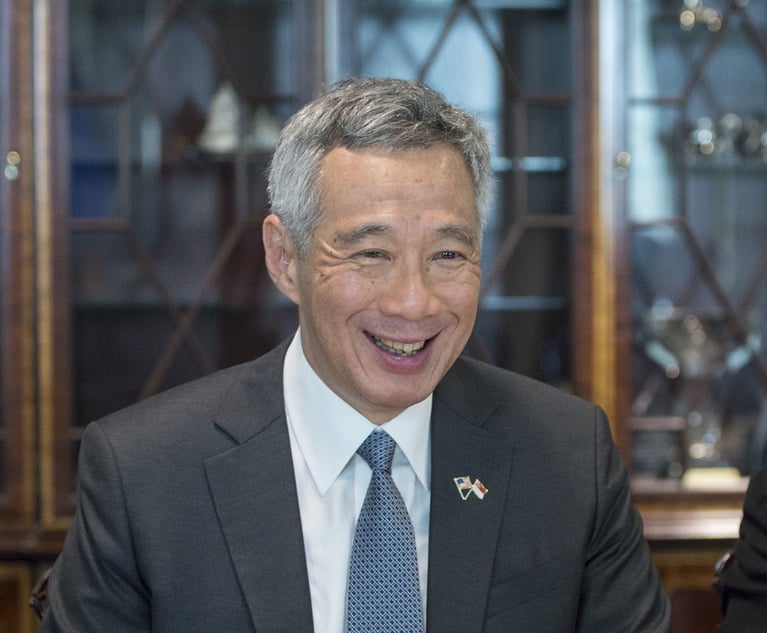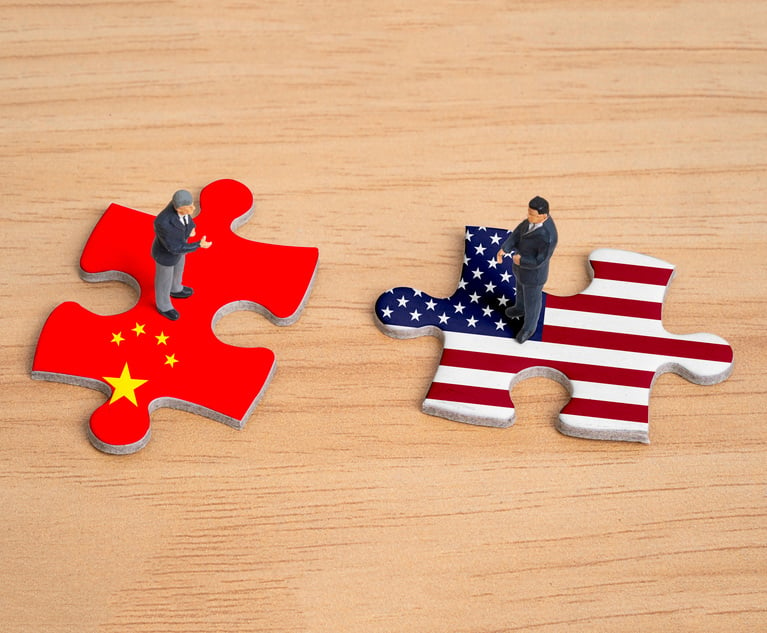Hong Kong's foreign judges in focus amid calls for Chinese nationals
Foreign judges in Hong Kong have come under scrutiny after a mainland China scholar argued that all judges in the region's top court should be local experts. The comments by Tsinghua University professor Cheng Jie, as reported by the South China Morning Post, included the assertion that Hong Kong's Court of Final Appeal was not just a court for Hong Kong but also "a national court", and as such that all judges should be Chinese nationals, or at least have Hong Kong permanent residency.
November 20, 2012 at 07:03 PM
3 minute read
Foreign judges in Hong Kong have come under scrutiny after a mainland China scholar argued that judges in the region's top court should be local experts.
The comments by Tsinghua University professor Cheng Jie, as reported by the South China Morning Post, included the assertion that Hong Kong's Court of Final Appeal was not just a court for Hong Kong but also "a national court", and as such all judges should be Chinese nationals, or at least have Hong Kong permanent residency.
The remarks came in the wake of a statement by former Hong Kong justice secretary Elsie Leung Oi-sie, who said that the region's legal sector, and judges in particular, did not understand the relationship between Hong Kong and Beijing.
The comments have sparked heated debate among justice officials and industry leaders in the region, evoking wider concerns about Hong Kong's judicial independence – which is seen as being upheld by foreign judges.
"[The comments are] not surpising, because Beijing has always been saying that courts in Hong Kong on basic issues are not particularly reliable," said Professor Fu Hualing, the head of the legal faculty at the University of Hong Kong.
"Most people want to have foreign judges in Hong Kong's legal community, but you occasionally have people from China raising an eyebrow, saying you can't trust a foreigner in Hong Kong making important decisions.
"The wider issue is about the identity of Hong Kong, and to what degree it is still part of China. There are people who think Hong Kong may be drifting away from China 15 years after reunification… and of course the judiciary is a crucial part of it."
Under the Hong Kong Basic Law, only the Chief Justice of the Court of Final Appeal and the Chief Judge of the High Court are required to be local citizens, which means judges from the UK, New Zealand and Australia regularly participate in local trials.
The rules are unlike those in other jurisdictions such as the US and Canada, where local citizenship is a prerequisite to sit in the Supreme Court.
Currently 10 of the 15 judges in Hong Kong's Court of Final Appeal are foreign, typically from Commonwealth countries, while the majority are also non-permanent.
Former chief justice Andrew Li Kwok-nang has subsequently called for the legal sector to maintain its judicial independence by holding on to the provisions of the Basic Law.
The Hong Kong Bar Association has also spoken out in defence of foreign judges, saying that any shake-up in Hong Kong's top court would contradict the Sino-British Joint Declaration signed in 1984, which stipulated a "one country, two systems" principle.
Local experts perceive the comments as an attempt to put pressure on the Hong Kong legal system, but believe they are unlikely to spark any radical change in the short term.
"It will be difficult to change [the criteria for judges] unless you change the law, and I don't think Beijing will change the law," said Fu. "The pressure will be very subtle, in the hopes that [in the long term] the courts will exercise some form of self-censorship."
This content has been archived. It is available through our partners, LexisNexis® and Bloomberg Law.
To view this content, please continue to their sites.
Not a Lexis Subscriber?
Subscribe Now
Not a Bloomberg Law Subscriber?
Subscribe Now
NOT FOR REPRINT
© 2025 ALM Global, LLC, All Rights Reserved. Request academic re-use from www.copyright.com. All other uses, submit a request to [email protected]. For more information visit Asset & Logo Licensing.
You Might Like
View All
Singapore Leaders Stress the Importance of the Rule of Law Amid Geopolitical Tensions

Can Law Firms Avoid Landing on the 'Enemy' List During the Trump Administration?
5 minute read

Letter From Asia: Will Big Law Ever Bother to Understand Asia Again?
Trending Stories
- 1Bar Report - Jan. 20
- 2Saxton & Stump Lands Newly Retired Ex-Chief Judge From Middle District of Pa.
- 3Judicial Admissions and Medical Malpractice Defense
- 4South Florida Attorney Charged With Aggravated Battery After Incident in Prime Rib Line
- 5'A Death Sentence for TikTok'?: Litigators and Experts Weigh Impact of Potential Ban on Creators and Data Privacy
Who Got The Work
J. Brugh Lower of Gibbons has entered an appearance for industrial equipment supplier Devco Corporation in a pending trademark infringement lawsuit. The suit, accusing the defendant of selling knock-off Graco products, was filed Dec. 18 in New Jersey District Court by Rivkin Radler on behalf of Graco Inc. and Graco Minnesota. The case, assigned to U.S. District Judge Zahid N. Quraishi, is 3:24-cv-11294, Graco Inc. et al v. Devco Corporation.
Who Got The Work
Rebecca Maller-Stein and Kent A. Yalowitz of Arnold & Porter Kaye Scholer have entered their appearances for Hanaco Venture Capital and its executives, Lior Prosor and David Frankel, in a pending securities lawsuit. The action, filed on Dec. 24 in New York Southern District Court by Zell, Aron & Co. on behalf of Goldeneye Advisors, accuses the defendants of negligently and fraudulently managing the plaintiff's $1 million investment. The case, assigned to U.S. District Judge Vernon S. Broderick, is 1:24-cv-09918, Goldeneye Advisors, LLC v. Hanaco Venture Capital, Ltd. et al.
Who Got The Work
Attorneys from A&O Shearman has stepped in as defense counsel for Toronto-Dominion Bank and other defendants in a pending securities class action. The suit, filed Dec. 11 in New York Southern District Court by Bleichmar Fonti & Auld, accuses the defendants of concealing the bank's 'pervasive' deficiencies in regards to its compliance with the Bank Secrecy Act and the quality of its anti-money laundering controls. The case, assigned to U.S. District Judge Arun Subramanian, is 1:24-cv-09445, Gonzalez v. The Toronto-Dominion Bank et al.
Who Got The Work
Crown Castle International, a Pennsylvania company providing shared communications infrastructure, has turned to Luke D. Wolf of Gordon Rees Scully Mansukhani to fend off a pending breach-of-contract lawsuit. The court action, filed Nov. 25 in Michigan Eastern District Court by Hooper Hathaway PC on behalf of The Town Residences LLC, accuses Crown Castle of failing to transfer approximately $30,000 in utility payments from T-Mobile in breach of a roof-top lease and assignment agreement. The case, assigned to U.S. District Judge Susan K. Declercq, is 2:24-cv-13131, The Town Residences LLC v. T-Mobile US, Inc. et al.
Who Got The Work
Wilfred P. Coronato and Daniel M. Schwartz of McCarter & English have stepped in as defense counsel to Electrolux Home Products Inc. in a pending product liability lawsuit. The court action, filed Nov. 26 in New York Eastern District Court by Poulos Lopiccolo PC and Nagel Rice LLP on behalf of David Stern, alleges that the defendant's refrigerators’ drawers and shelving repeatedly break and fall apart within months after purchase. The case, assigned to U.S. District Judge Joan M. Azrack, is 2:24-cv-08204, Stern v. Electrolux Home Products, Inc.
Featured Firms
Law Offices of Gary Martin Hays & Associates, P.C.
(470) 294-1674
Law Offices of Mark E. Salomone
(857) 444-6468
Smith & Hassler
(713) 739-1250








